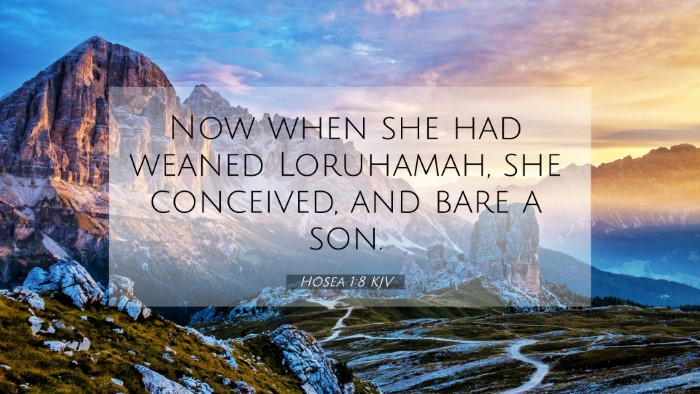Old Testament
Genesis Exodus Leviticus Numbers Deuteronomy Joshua Judges Ruth 1 Samuel 2 Samuel 1 Kings 2 Kings 1 Chronicles 2 Chronicles Ezra Nehemiah Esther Job Psalms Proverbs Ecclesiastes Song of Solomon Isaiah Jeremiah Lamentations Ezekiel Daniel Hosea Joel Amos Obadiah Jonah Micah Nahum Habakkuk Zephaniah Haggai Zechariah MalachiHosea 1:8 Similar Verses
Hosea 1:8 Cross References
Now when she had weaned Loruhamah, she conceived, and bare a son.
Uncover the Rich Themes and Topics of This Bible Verse
Listed below are the Bible themes associated with Hosea 1:8. We invite you to explore each theme to gain deeper insights into the Scriptures.
Hosea 1:8 Cross Reference Verses
No cross reference images were found in our system for this Bible passage.
Hosea 1:8 Verse Analysis and Similar Verses
Understanding Hosea 1:8
Hosea 1:8 states, "Now when she had weaned Lo-Ruhamah, she conceived and bore a son." This verse is pivotal within the tapestry of prophetic literature, where familial dynamics become metaphors for divine relationships. The context of this verse provides a deep insight into the themes of judgment, mercy, and restoration.
Contextual Analysis
In this verse, we see the continuation of Hosea's marriage to Gomer, whose naming reflects significant spiritual truths regarding Israel's behavior. Public domain commentaries by Matthew Henry, Albert Barnes, and Adam Clarke focus on the implications of the names given to Hosea's children as symbols of God's covenant relationship with Israel.
Insights from Public Domain Commentaries
-
Matthew Henry:
Henry emphasizes the grace God shows through the prophetic act of naming. The child's name, connected to the weaning of Lo-Ruhamah, symbolizes a transition from judgment (Lo-Ruhamah means “not pitied”) to a new opportunity for growth and reconciliation.
-
Albert Barnes:
Barnes notes that this birthing imagery represents not only physical birth but also a spiritual rebirth for Israel. The act of weaning signifies moving from a state of dependency to maturity, which parallels Israel's relationship with God.
-
Adam Clarke:
Clarke elaborates that this verse points toward the transformation in God's approach to Israel. The conception of a new son represents hope in the midst of judgment, suggesting God's enduring mercy despite Israel's failures.
Thematic Connections
Hosea 1:8, when examined through the lens of thematic Bible verse connections, leads us to explore several key biblical themes:
- Judgment and Mercy: The juxtaposition of the weaning process indicates a shift from divine judgment (Lo-Ruhamah) to the potential for mercy and reconciliation.
- Spiritual Rebirth: The birth of a new child symbolically represents hope for Israel's future and the possibility of returning to covenant fidelity.
- Divine Love: Gomer's children embody the complexities of God’s love for His people, illustrating the tension between judgment and compassion.
Bible Verse Cross-References
Understanding Hosea 1:8 can be enriched by examining various cross-references. Below are several verses that illuminate the connections between biblical texts:
- Hosea 2:1: "Say to your brethren, 'My people,' and to your sisters, 'Mercy is shown!'" - A continuation of the themes of judgment turning to mercy.
- Isaiah 54:5: "For your Maker is your husband, the Lord of hosts is His name." This highlights the divine husbandry theme seen in Hosea's prophetic narrative.
- Jeremiah 31:20: "Is Ephraim My dear son? Is he a pleasant child?" - Reflecting the deep affection God holds for Israel despite their disobedience.
- Romans 9:25-26: "As He says also in Hosea..." - Paul references Hosea to explain the inclusion of Gentiles and restoration of Israel.
- Matthew 2:15: "Out of Egypt I called My son." - Referring back to Israel's past, invoking themes of redemption and calling.
- Galatians 4:4-5: Describing the coming of Christ to redeem those under the law, echoing themes from Hosea regarding restoration.
- 1 Peter 2:10: "Once you were not a people, but now you are God's people." - A reaffirmation of identity and belonging captured in Hosea's narrative.
Comparative Bible Verse Analysis
When conducting a comparative Bible verse analysis, one notices the thread of God's persistent pursuit of His people despite their unfaithfulness. The theme of children and their names throughout the Scriptures serves as a profound tool for teaching and reflection.
Concluding Thoughts
Hosea 1:8 encapsulates significant themes of God's relationship with His people, portraying judgment, hope, and mercy. By engaging with public domain commentaries and exploring linked verses, we deepen our understanding of how scripture dialogues with itself, illuminating God's character and his enduring covenant.


